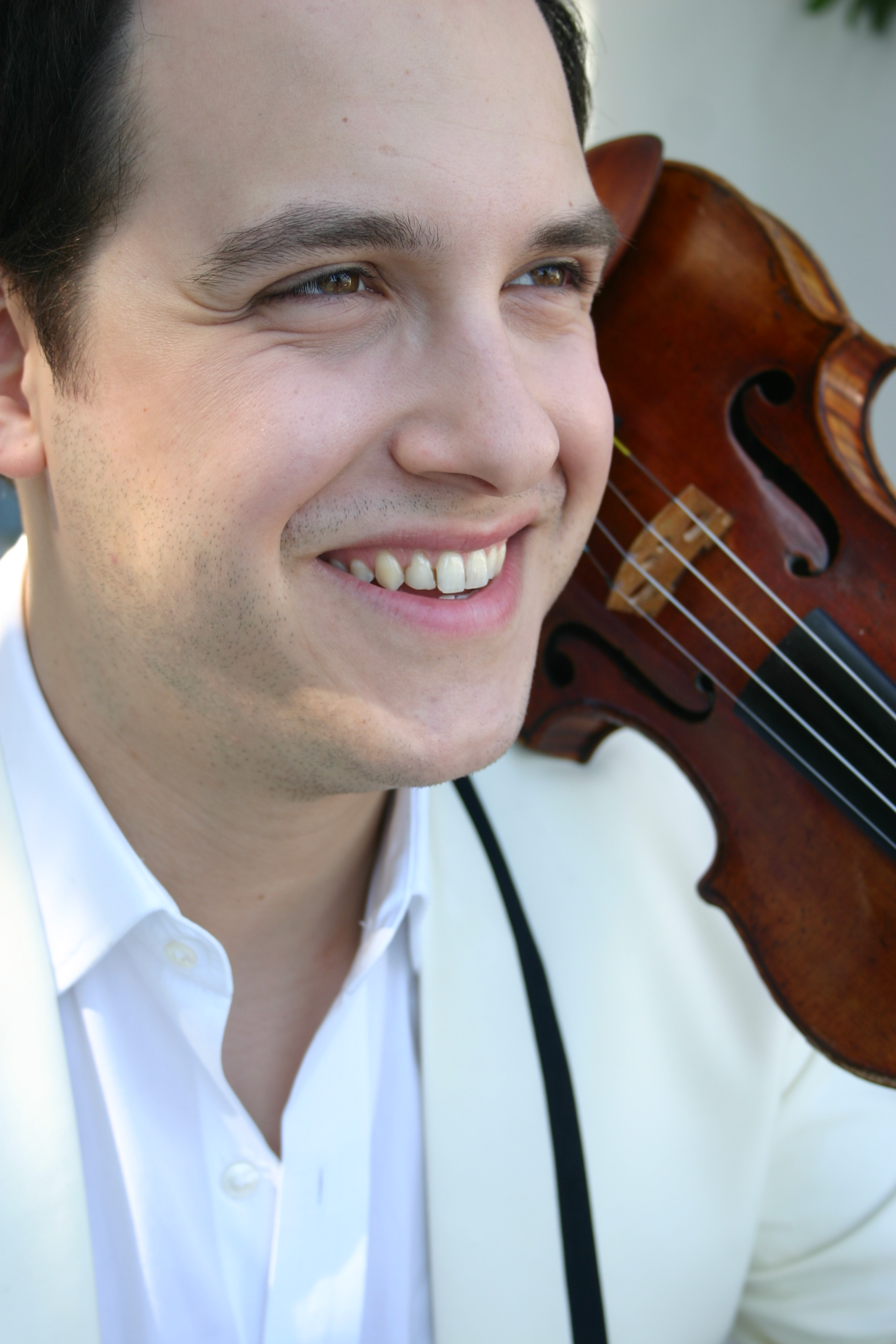Young violinist strives to bring back the Golden Age
 Although the young violinist Giora Schmidt is a product of Itzhak Perlman’s studio at Juilliard, he does not aspire to be an exact replica of the great virtuoso.
Although the young violinist Giora Schmidt is a product of Itzhak Perlman’s studio at Juilliard, he does not aspire to be an exact replica of the great virtuoso.
Schmidt reveres Perlman, with whom he studied for several years. At his recital Sunday at the University of Miami, he will perform with Perlman’s longtime collaborator, the pianist Rohan De Silva. And while in town last April to play a Mozart concerto, he drove up to Boca Raton, where Perlman was giving a concert, to go over a couple of Paganini caprices at Perlman’s suite at the Boca Beach Club.
But Schmidt aspires – with Perlman’s full approval – to establish his own style of violin playing in a world filled with what he believes are note-perfect performers with glossy, icy tones and little individuality. He sees Perlman – and he hopes, one day, himself – as heir to a golden age of violin playing that peaked in the middle of the 20th century, an age of largely Russian-Jewish virtuosos who emphasized a throaty sound, a Romantic repertoire and a deeply individual style of playing. You only need hear a few notes to know it was Mischa Elman or Nathan Milstein or David Oistrakh.
“There is a great tradition of violin playing that I think is dangerously getting lost,” Schmidt said, over a lunch of panini in downtown Miami. “The generation when violinists had their own voices. There’s a weight to the sound, a tension to the sound, that grabs you. It’s seasoned with vibrato, and it’s seasoned with a spoken element. Today when you turn on the radio, everybody sounds great, but if you ask me who’s playing, I don’t know.”
His focus on originality found a congenial home in Perlman’s class at Juilliard. The renowned virtuoso was a demanding teacher – putting Schmidt’s love for the Mendelssohn Violin Concerto to a severe test by requiring him to play the first two lines about 500 times at an excruciatingly slow speed to learn to play each note perfectly in tune.
But the most striking thing was something Perlman didn’t do: He didn’t bring his own violin to the lesson. He never demonstrated. He just talked. Perlman was not unaware of the weight of his own reputation, and he didn’t want it to smother the individuality of his students.
Schmidt also had before him the cautionary tale of the reigning violin virtuoso of a previous generation, Jascha Heifetz. As a teacher Heifetz dominated his students’ lives, prohibiting women from wearing trousers and fining students who failed to attend performances by well-known violinists. His studio produced no major stars, and the one with the closest thing to an international career, Erick Friedman, was best known for sounding a lot like Heifetz.
“Perlman was adamant about having everyone sound like themselves at the end of the day,” Schmidt said. “He was aware of the Heifetz phenomenon, and he didn’t want that.”
Schmidt was born in Philadelphia to professional musicians from Israel. He picked up the violin at four, progressed quickly and entered Perlman’s summer music program, moving on to Juilliard’s pre-college and then entering the famous conservatory as a full-time student. Now at age 26, he is establishing himself as a touring virtuoso, with concert, recital and chamber music performances.
Although so far most of his engagements have been with second and third tier orchestras, such as those of Honolulu, Charleston and Long Island, he has received stellar reviews, with The New York Times praising his “lush, shapely sound” and Newsday calling his performance of the Beethoven Violin Concerto “fresh, almost improvisatory, as if the music had never been heard before.”
The Perlman connection, of course, has done his career no harm. It was at Perlman’s 60th birthday party at The Ritz-Carlton on Key Biscayne that Miami impresaria Judy Drucker heard Schmidt perform Mozart’s Sinfonia Concertante, with Pinchas Zukerman on the viola part. “It was so beautiful,” she said. “He’s taken the best from Itzhak Perlman and Pinchas Zukerman. And he has such a wonderful stage manner.” As a result, she engaged him for the Concert Association of Florida to perform the Mendelssohn concerto with the Israel Chamber Orchestra.
In his recital Sunday, part of the Sunday Afternoons of Music series, he will play the Debussy Sonata and the Brahms Sonata in A Major, “pieces that I’ve loved to play for a long time and thought would be complementary.” He will play Tartini’s Devil’s Trill Sonata, a work popular with the old-time virtuosos, but “it’s one of those pieces that has sort of fallen out of fashion and rarely heard in public these days.” And he will announce works from the stage – “It makes the recital hall into a living room.”
The pianist who will perform with him, De Silva, has played with some of the world’s great violinists, including, in addition to Perlman, Cho-Liang Lin, Midori and Joshua Bell. De Silva met Schmidt when the violinist was waiting for a lesson at Juilliard’s pre-college, a “very, very talented, very serious” 16-year-old. Today, he said, Schmidt displays a musical maturity and largeness of conception that’s rare in young performers.
“Nowadays, there are a lot of very, very talented people who have fabulous technique, but few stand out as musicians,” De Silva said. “Giora’s style of playing is like the good old timers, like Oistrakh and Milstein. He gets this very noble grandeur into his playing.”
Giora Schmidt and Rohan De Silva perform Sunday at 4 p.m. at the University of Miami’s Gusman Hall, as part of the Sunday Afternoons of Music series. For tickets call 305-271-7150 or visit www.sundaymusicals.org
Posted in Articles
Leave a Comment
Thu Jun 11, 2009
at 1:41 pm
No Comments